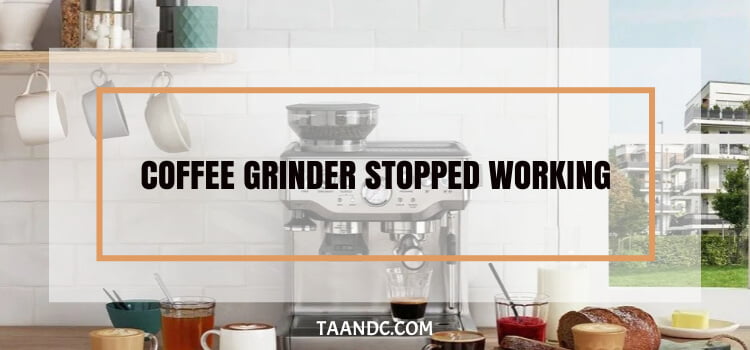It was a dreary morning when I walked into my kitchen, eager to kickstart my day with a fresh cup of coffee. But there it was, my trusty old Coffee Machine Broken, utterly uncooperative. The familiar gurgle and aroma were absent. Instead, I was met with silence and disappointment. A coffee machine can feel like a minor catastrophe if you're like me, and your morning ritual depends on that caffeine jolt. Don't fret; I've been there too. In this post, I'll share my experience and some practical tips on what to do when your coffee machine decides to take an unexpected coffee break.

Diagnosing the Issue
Diagnosing the issue when your coffee machine breaks down is the first step toward restoring your morning ritual. Understanding the common signs of a malfunctioning coffee maker, such as strange noises, incomplete brewing, or unusual odours, can help you pinpoint the problem. Identifying these symptoms early ensures you can promptly fix the issue or seek professional assistance. This section will explore these indicators to help you determine precisely what's ailing your coffee machine.
Read Also: Fresko Espresso Machine
Common Signs of a Coffee Machine Breakdown
If you're a coffee enthusiast like me, you'll know that a working coffee machine is a morning savior. However, there comes a time when our trusty caffeine companion decides to act up. Let's explore the common signs that indicate your coffee machine is broken on the fritz.
Lack of Brewing
The most obvious sign is when your coffee machine refuses to brew. You hit the button, but no sound, coffee, or delightful aroma fills the air.
Weak Coffee Output
If your coffee is suddenly weaker than usual, even with the same amount of coffee grounds, it might be a sign of a malfunction. A functional machine should consistently deliver your preferred coffee strength.
Strange Noises
Unusual clanking, grinding, or whirring sounds can be red flags. Coffee machines should operate smoothly, so any new noises are cause for concern.
Water Leakage
Finding puddles or drips of water around your machine is a clear indicator that something is amiss. A properly functioning coffee maker should keep all liquids inside.
Incomplete Brewing
Incomplete brewing cycles, where your machine stops mid-process, are a headache. You're left with a partially brewed mess and a lot of frustration.
Error Messages
Some modern coffee machines come with digital displays that might show error messages. Please pay attention to these messages, which provide valuable information about the issue.
Unusual Smells
If your coffee suddenly has an off-putting smell or taste, it could indicate a malfunction. The brewing process should enhance the coffee's aroma, not detract from it.
Inconsistent Temperature
Coffee should be brewed at a specific temperature range for optimal flavor. If your machine can't consistently maintain this temperature, it's a sign of trouble.
Slow Brewing
A coffee machine should produce your morning brew swiftly. If it starts taking an unusually long time, it might need attention.
Old Age
Sometimes, the culprit is simply the age of your machine. Coffee makers have a lifespan; if yours is past its prime, it might be time for a replacement.
Troubleshooting Tips
Troubleshooting your coffee machine is like being your barista detective. This section will equip you with the practical know-how to handle common issues that can disrupt your daily coffee routine. From checking the power supply to experimenting with coffee grounds, these DIY fixes can help you resurrect your beloved coffee maker from minor hiccups and ensure a steaming cup of perfection each morning. Let's dive into the world of "Troubleshooting Tips" to bring your coffee machine back to life!
Read Also: Famiworths Single Serve Coffee Maker
DIY Fixes for a Broken Coffee Machine
So, is your beloved coffee machine showing signs of trouble? Wait to fret; there are often simple solutions to get it back in working order. This section will explore some DIY fixes for a broken coffee machine that can save you time and money. Let's roll up our sleeves and get started!
Check the Power Supply
Ensure your coffee machine is properly plugged in and receiving power. Loose cords or tripped switches can easily be the culprits.
Clean the Coffee Maker
Residue buildup can sometimes result in a lackluster brew. Regularly clean your coffee maker, including the carafe, filter, and brewing components. A good cleaning can work wonders.
Descale Your Machine
Over time, mineral deposits from water can accumulate in your coffee maker, affecting its performance. Descaling solutions or a mixture of vinegar and water can help remove these deposits.
Inspect the Water Reservoir
Ensure the water reservoir is seated correctly. Sometimes, it can be slightly askew, preventing water from flowing correctly.
Replace Damaged Parts
If you notice damaged components, such as cracked carafes or malfunctioning switches, consider replacing them. Most parts are readily available online.
Adjust Coffee Grounds
Experiment with the coarseness of your coffee grounds. Adjusting the grind level can lead to better brews.
Check Water Quality
The water quality you use matters. If tap water has a strong odor or taste, it can affect your coffee. Using filtered or bottled water might help.
Run a Cleaning Cycle
Many modern coffee machines come with a cleaning or descaling cycle. Running this cycle periodically can help maintain your machine's performance.
Review the User Manual
When in doubt, consult your coffee maker's user manual. It often contains troubleshooting tips specific to your machine's make and model.
Contact Customer Support
If all else fails, contact the manufacturer's customer support. They can provide guidance or recommend certified repair centers. Following these DIY fixes and troubleshooting steps will increase the chances of reviving your coffee machine without professional intervention. After all, a little care and attention can go a long way in keeping your morning brew on track.
Read Also: Gtc Coffee Maker
When to Seek Professional Help
Knowing when to seek professional help for your coffee machine is vital for its well-being and peace of mind. In this section, we'll explore the circumstances where calling in a coffee machine expert is the smart choice. From electrical issues and internal component failures to warranty considerations and safety concerns, understanding these signals will help you make the right decision and ensure your coffee machine gets the specialized care it deserves.
Knowing When It's Time for a Coffee Machine Expert
As much as we enjoy a little DIY magic, there are instances when even the hardiest of us should raise the white flag and seek professional assistance for a broken coffee machine. In this section, we'll delve into those situations where it's best to call in a coffee machine technician. Recognizing these signs can prevent further damage and ensure your coffee machine gets the expert care it deserves.
Electrical Issues
If you suspect electrical problems with your coffee maker, such as frayed cords, sparks, or an irregular power supply, it's crucial to have a professional technician examine it. Electrical issues can be hazardous.
Internal Component Failures
When critical components like the heating element, pump, or control board malfunction, it's best left to professionals. Attempting to fix these complex parts yourself can lead to costly mistakes.
Warranty Coverage
If your coffee machine is still under warranty, tinkering alone might void the warranty. Professional repair ensures you can maintain manufacturer support.
Unusual Noises or Odors
Persistent strange noises or odd smells from your coffee machine could indicate severe internal issues. Technicians can diagnose and resolve these problems safely.
Water Leaks Persist
A coffee maker that consistently leaks water despite your efforts to fix it may have structural damage or seal issues that require expert attention.
Complex Repairs
Some repairs, like fixing a leaking boiler or replacing a malfunctioning control panel, require specialized tools and expertise. A professional technician is equipped to handle such complexities.
Safety Concerns
If you have doubts about fixing the machine safely, it is best to avoid any DIY attempts that might compromise your safety or functionality.
Frequent Breakdowns
If your coffee machine seems to break down repeatedly, it signs underlying issues. A technician can identify and address the root cause, saving you from continuous frustration.
Inadequate Brew Quality
If your machine consistently fails to deliver the desired coffee quality, even after cleaning and adjustments, it's time to consult an expert who can fine-tune its performance.
Vintage or Specialty Machines
Vintage or specialty coffee machines often require specialized repair knowledge. To avoid harming these unique devices, seek a technician with experience in your machine's make and model.
Preventing Future Breakdowns
Preventing future breakdowns of your coffee machine is as crucial as fixing existing issues. Regular cleaning, descaling, and filter replacement are the basics that ensure your coffee maker operates smoothly. Checking seals, inspecting power cords, and using quality water all contribute to a longer machine life. Proper storage, following the manufacturer's guidelines, and occasional professional checkups are the finishing touches to safeguard your caffeine companion. By adopting these maintenance habits, you'll enjoy consistently great coffee and extend the lifespan of your beloved coffee machine.
Maintenance Tips to Keep Your Coffee Machine Running
Now that we've tackled diagnosing, troubleshooting, and knowing when to call in the pros, it's time to embark on a proactive journey. Regular maintenance is your secret weapon against future coffee machine breakdowns. In this section, we'll explore essential maintenance practices that will extend the lifespan of your beloved coffee machine and keep it brewing that perfect cup. Let's dive in!
Regular Cleaning
This is the simplest yet most effective maintenance tip. Clean your coffee maker after every use. Wash the carafe and removable parts, and wipe down the exterior to prevent the buildup of coffee residue and oils.
Descale Periodically
Descaling should be done regularly, depending on your water's mineral content. Follow your machine's instructions or use a descaling solution to remove mineral deposits from the internal components.
Replace Filters
If your coffee maker uses filters, replace them as the manufacturer recommends. Dirty or clogged filters can affect the flavor and flow of your coffee.
Check Seals and Gaskets
Inspect the seals and gaskets for signs of wear or damage. Replace them promptly to prevent leaks and ensure a proper seal.
Clean the Water Reservoir
Mold and mildew can develop in the reservoir if left unchecked. Clean it thoroughly and allow it to air dry between uses.
Inspect Power Cords
Inspect the power cords for wear or damage. If you notice fraying or exposed wires, replace them immediately.
Use Filtered Water
If tap water has a high mineral content or an unpleasant taste, consider using filtered or bottled water. This can prevent mineral buildup and enhance the flavor of your coffee.
Store Properly
When not in use, store your coffee machine in a dry, cool place. Avoid exposing it to extreme temperatures or moisture.
Follow the User Manual
Refer to your coffee maker's manual for manufacturer-specific maintenance guidelines. They often contain valuable tips tailored to your machine.
Professional Checkups
Consider scheduling periodic checkups with a professional technician, even if your machine seems fine. They can spot and address potential issues before they become significant problems.
Exploring Coffee Machine Alternatives
When your trusty coffee machine reaches the end of its road, it's time to embark on a delightful journey of exploring coffee machine alternatives. In this section, we'll guide you through various options, from replacing with a similar model to diving into the world of manual brewing or even considering an espresso upgrade. Whether you value convenience, versatility, or the art of hands-on coffee making, we have alternatives to satisfy your coffee cravings. Let's discover the exciting array of possibilities that await, ensuring your mornings remain steeped in the joy of a perfect cup of coffee.
Options When Your Coffee Machine Is Beyond Repair
So, you've faced the unfortunate reality of a coffee machine beyond repair. It's a coffee lover's nightmare, but fear not – there are alternatives to satisfy your caffeine cravings. This section will explore the choices for those dealing with a wholly broken machine. Whether you're looking for a replacement coffee maker or considering an upgrade, we've got you covered.
Replacing with a Similar Model
If your old coffee machine served you well, consider getting a newer version of the same model or a similar one from the same brand. This ensures you'll maintain the brewing style you love.
Exploring Different Brewing Methods
It may be time to venture into manual brewing methods. Options like French presses, pour-over drippers, or Aeropress can offer a unique coffee experience.
Single-Serve Coffee Makers
Single-serve machines, like Keurig or Nespresso, are convenient and offer various coffee options. They can be a good choice if you value speed and versatility.
Upgrading to Espresso
If you're ready to take your coffee game to the next level, consider investing in an espresso machine. It allows you to make a wide range of espresso-based drinks.
Coffee Grinder and French Press Combo
This combination can deliver a robust coffee experience for those who appreciate freshly ground beans and a hands-on approach.
Coffee Subscription Services
Opt for the convenience of coffee subscription services that deliver freshly roasted beans or pre-made pods to your doorstep, ensuring a steady supply of quality coffee.
Coffee Shops and Cafés
If you can't replace your machine immediately, frequenting local coffee shops or cafés can fix your daily caffeine.
Rent or Borrow
If you need more certainty about investing in a new machine immediately, consider renting or borrowing one from friends or family until you decide.
DIY Coffee Hacks
Get creative with makeshift solutions, such as using a mason jar or a sock as a coffee filter in a pinch.
Explore Specialty Coffee Gear
Dive into specialty coffee gear, such as siphon or cold brew makers, to craft unique coffee creations at home.
Choosing the suitable alternative for your coffee needs is a personal journey. When exploring these options, consider your preferences, budget, and how you like coffee. While saying goodbye to your broken coffee machine can be challenging, it can also be the beginning of a new and exciting coffee adventure.
FAQ
Why is my coffee machine not brewing?
Your coffee machine may not be brewing due to issues with the power supply, clogged filters, or malfunctioning components.
Can I repair a broken coffee machine myself?
You can attempt to repair minor issues, but for complex problems or electrical issues, it's best to consult a professional technician.
How often should I clean and descale my coffee machine?
For optimal performance, it is recommended that you clean your coffee machine after every use and decal it periodically, depending on the water's hardness.
Is it worth repairing an old coffee machine?
It depends on the extent of the damage and the machine's age. Sometimes, investing in a new one may be more cost-effective.
What are the signs that my coffee machine is beyond repair?
Signs include persistent electrical issues, internal component failures, and frequent breakdowns that DIY fixes can't resolve.
Conclusion
Understanding its common signs and implementing practical troubleshooting tips can often resurrect your morning brew when faced with a broken coffee machine. Regular maintenance practices, as detailed in the section on preventing future breakdowns, not only extend the lifespan of your coffee maker but also ensure consistent performance. However, there are times when professional help becomes essential, especially for electrical or complex issues. Exploring alternative coffee solutions, as outlined in the coffee machine alternatives section, can also satisfy your caffeine cravings. At the same time, you decide on your next coffee machine. With the proper knowledge and actions, you can overcome the challenges of a malfunctioning coffee machine and continue to enjoy your daily cup of joe.


